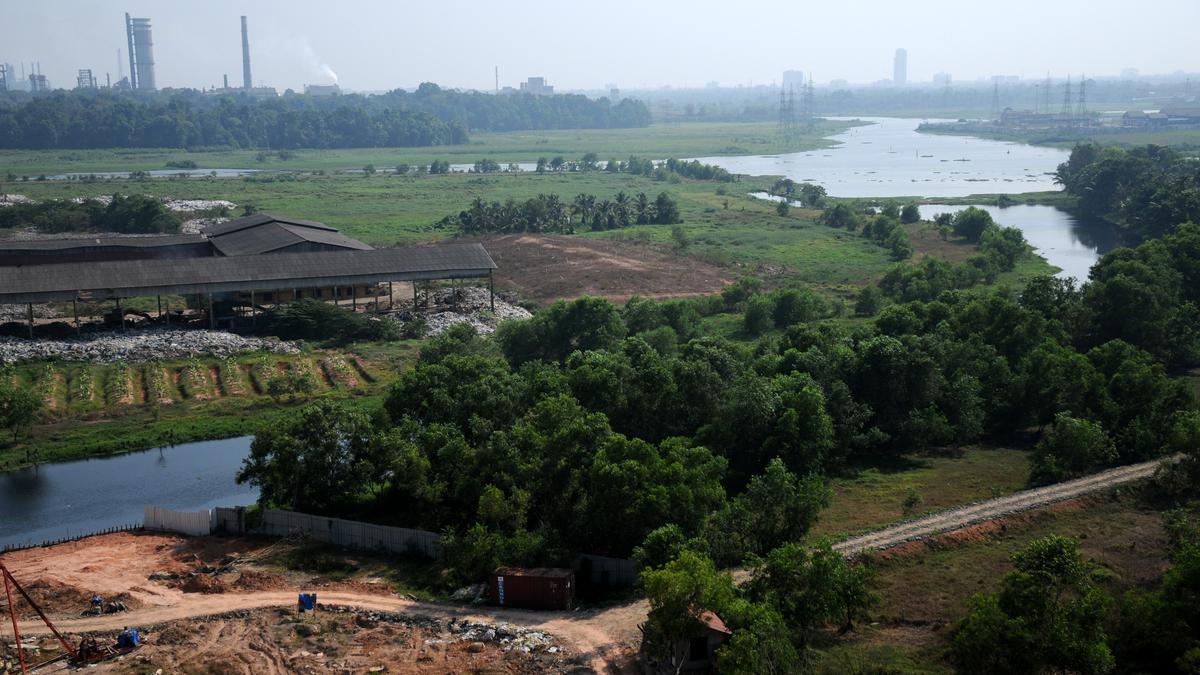
Infopark Kochi waterlogging: Bed profile study of Kadamprayar river in Kerala may help identify water flow issue
The Hindu
Infopark Kochi waterlogging: Bed profile study of Kadamprayar river in Kerala may help identify water flow issue
A bathymetry, or study of the ‘beds’ of waterbodies, may have to be conducted in Kadamprayar to verify whether the river bed has turned uneven, having potential repercussions for the smooth flow of water.
If the study shows that the river bed profile has an uneven surface, corrective measures will have to be taken.
Bathymetry is a study facilitating measurement of the depth of a water body. The execution of the study will depend on the allocation of funds. Funding could be raised either through corporate social responsibility funds or from agencies such as Kochi Metro Rail Limited or the Centre for Water Resources Development and Management or from Irrigation department’s funds.
The need for such a study in Kadamprayar has emerged in the wake of severe waterlogging experienced on the Infopark Kochi campus and nearby areas for two days running this week. The drainage network on the Infopark campus discharges the rainwater to Kadamprayar, leading to a public outcry over the neglected state of the river as the reason for the unprecedented waterlogging. Demolishing a temporary bund in Kadamprayar was supposed to ease flooding, though it did little good.
“The speed of water flow in Kadamprayar, which is almost like an independent river through the confluence of smaller canals, has been traditionally slow. Whether disruption to the flow has caused the waterlogging needs to be studied,” said Irrigation department sources.
Cleaning of Kadamprayar, including removal of water hyacinths, up to Manakkakadavu has been undergoing for the last couple of days.
Blocks in the drainage networks of Infopark Kochi or variation in the gradient owing to the development works on the campus and the neighbourhood have also emerged as potential reasons for the waterlogging.

“Writing, in general, is a very solitary process,” says Yauvanika Chopra, Associate Director at The New India Foundation (NIF), which, earlier this year, announced the 12th edition of its NIF Book Fellowships for research and scholarship about Indian history after Independence. While authors, in general, are built for it, it can still get very lonely, says Chopra, pointing out that the fellowship’s community support is as valuable as the monetary benefits it offers. “There is a solid community of NIF fellows, trustees, language experts, jury members, all of whom are incredibly competent,” she says. “They really help make authors feel supported from manuscript to publication, so you never feel like you’re struggling through isolation.”

Several principals of government and private schools in Delhi on Tuesday said the Directorate of Education (DoE) circular from a day earlier, directing schools to conduct classes in ‘hybrid’ mode, had caused confusion regarding day-to-day operations as they did not know how many students would return to school from Wednesday and how would teachers instruct in two modes — online and in person — at once. The DoE circular on Monday had also stated that the option to “exercise online mode of education, wherever available, shall vest with the students and their guardians”. Several schoolteachers also expressed confusion regarding the DoE order. A government schoolteacher said he was unsure of how to cope with the resumption of physical classes, given that the order directing government offices to ensure that 50% of the employees work from home is still in place. On Monday, the Commission for Air Quality Management in the National Capital Region and Adjoining Areas (CAQM) had, on the orders of the Supreme Court, directed schools in Delhi-NCR to shift classes to the hybrid mode, following which the DoE had issued the circular. The court had urged the Centre’s pollution watchdog to consider restarting physical classes due to many students missing out on the mid-day meals and lacking the necessary means to attend classes online. The CAQM had, on November 20, asked schools in Delhi-NCR to shift to the online mode of teaching.









